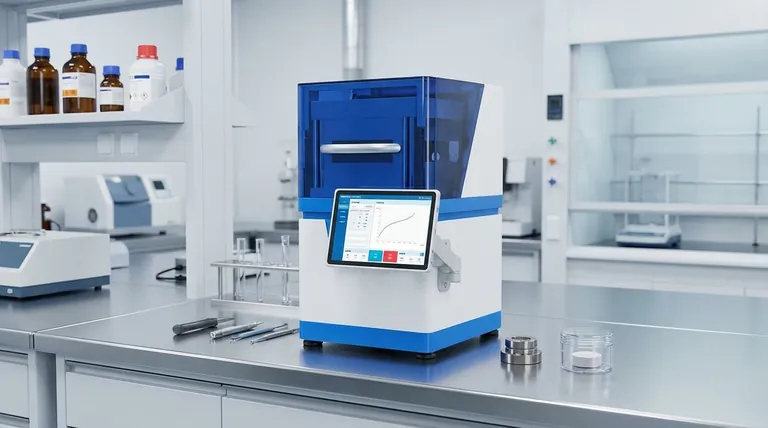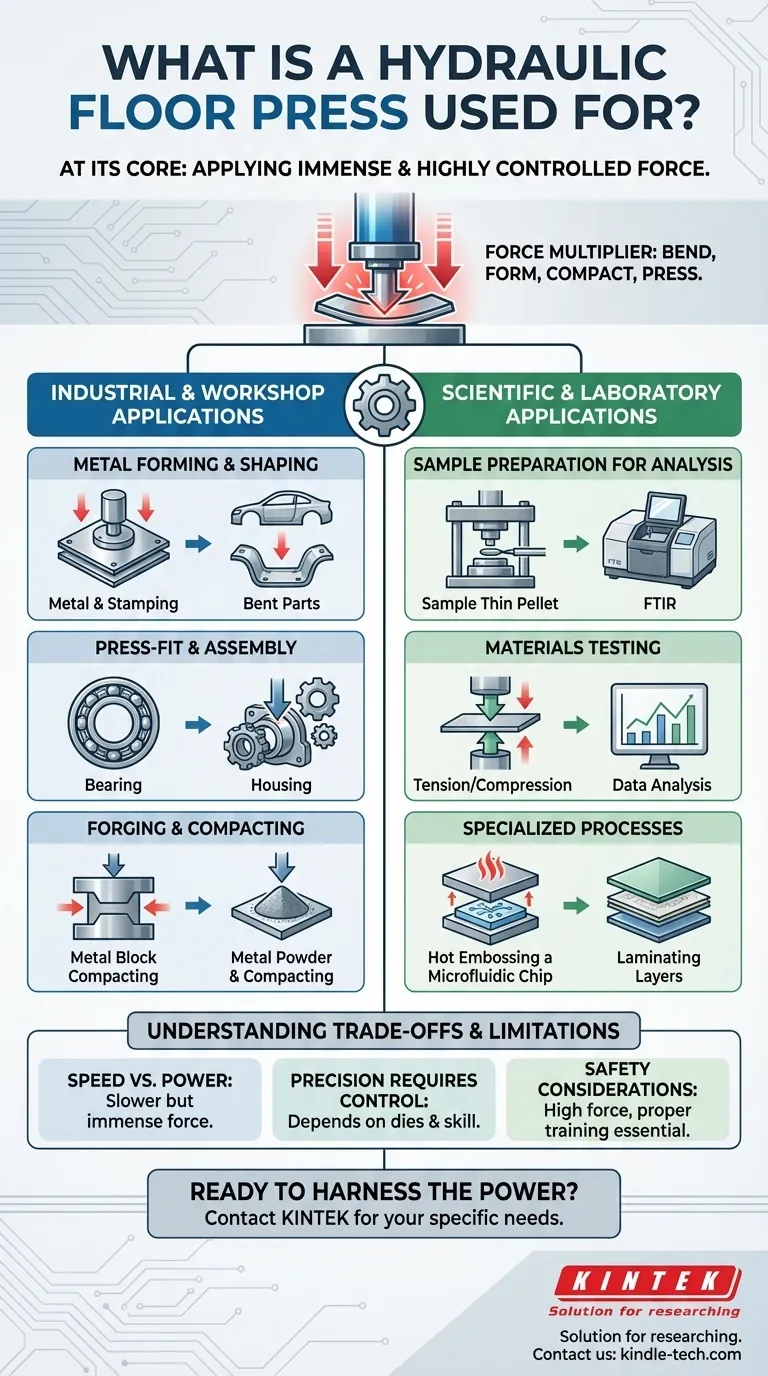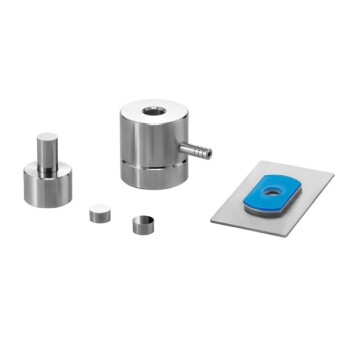At its core, a hydraulic press is a tool designed to apply an immense and highly controlled amount of force to an object. This fundamental capability allows it to perform a vast range of tasks across different fields, from pressing bearings and bending steel in a fabrication shop to preparing highly precise samples for spectroscopic analysis in a scientific laboratory.
A hydraulic press is a force multiplier. Its value comes not from a single function, but from its fundamental ability to press, bend, form, and compact materials with a level of power and control that is impossible to achieve by hand, making it indispensable in both heavy industry and precision lab work.

The Two Primary Domains of a Hydraulic Press
While versatile, the applications of a hydraulic press can be broadly categorized into two distinct environments: the industrial workshop and the scientific laboratory. Each environment leverages the tool's core function—applying force—for very different outcomes.
Industrial and Workshop Applications
In a manufacturing or repair setting, a hydraulic press is a workhorse for tasks that require overwhelming force to shape or assemble components.
Metal Forming and Shaping
The most common use is to permanently alter the shape of metal. This includes stamping flat sheets into forms like car body panels, deep drawing to create seamless containers, and bending heavy-gauge steel for structural components.
Press-Fit and Assembly
Many mechanical systems rely on interference fits, where two parts are held together by friction. A hydraulic press provides the necessary force to press bearings into housings, install bushings into suspension components, or mount gears onto shafts without damaging the parts.
Forging and Compacting
In forging, a press is used to squeeze metal into a specific shape using dies, creating extremely strong parts. It is also used in powder metallurgy to compact metal powders into a solid form before sintering.
Scientific and Laboratory Applications
In a laboratory, the same principle of immense force is used not for brute strength, but for precision, preparation, and testing.
Sample Preparation for Analysis
Spectroscopic analysis often requires a sample to be uniform and free of contaminants. A lab press is used to compress powdered materials, such as potassium bromide (KBr), into solid pellets or thin films for analysis with methods like FTIR and XRF.
Materials Testing
Engineers and material scientists use hydraulic presses to test the limits of materials. This includes tension testing, where a sample is pulled apart, and compression testing to determine a material's strength, durability, and failure points under high pressure.
Specialized Processes
Hydraulic presses are also essential for specialized R&D processes like hot embossing to create microstructures, laminating different material layers, and molding advanced composites like carbon fiber.
Understanding the Trade-offs and Limitations
While incredibly powerful, a hydraulic press is not the solution for every problem. Understanding its inherent trade-offs is key to using it effectively.
Speed vs. Power
Hydraulic systems are masters of force, but they are generally slower than their mechanical counterparts. For high-speed, repetitive tasks like stamping small parts, a mechanical press is often a better choice.
Precision Requires Control
The final result is only as precise as the dies, tooling, and operator controlling the press. While the force is controllable, achieving high-tolerance results requires significant skill and high-quality equipment.
Significant Safety Considerations
The immense forces generated by a hydraulic press create a serious safety hazard. Proper training, guarding, and personal protective equipment are absolutely essential to prevent catastrophic equipment failure or severe personal injury.
Making the Right Choice for Your Goal
To determine if a hydraulic press is the right tool, consider your primary objective.
- If your primary focus is automotive repair or metal fabrication: The press is an essential tool for press-fitting bearings, installing bushings, and bending structural components.
- If your primary focus is industrial manufacturing: The press is critical for high-force operations like deep drawing, forging, stamping large parts, and molding composites.
- If your primary focus is scientific research or quality control: A laboratory press is indispensable for preparing analytical samples and conducting materials strength testing.
Ultimately, a hydraulic press provides the controlled power necessary to fundamentally change the shape and structure of materials for nearly any purpose.
Summary Table:
| Application Domain | Key Uses |
|---|---|
| Industrial & Workshop | Metal forming (stamping, bending), press-fit assembly (bearings, bushings), forging, compacting. |
| Scientific & Laboratory | Sample preparation (KBr pellets for FTIR), materials testing (compression/tension), laminating, hot embossing. |
Ready to harness the power and precision of a hydraulic press for your projects?
Whether you are in industrial manufacturing, automotive repair, or scientific research, KINTEK's expertise in lab equipment and consumables ensures you get the right press for your specific needs. Our hydraulic presses deliver the controlled force required for everything from heavy-duty metal forming to delicate sample preparation.
Contact us today via our [#ContactForm] to discuss your application and discover how KINTEK can enhance your efficiency and results.
Visual Guide

Related Products
- Automatic Laboratory Heat Press Machine
- Laboratory Hydraulic Press Split Electric Lab Pellet Press
- Automatic Laboratory Hydraulic Press for XRF & KBR Pellet Press
- Manual High Temperature Heated Hydraulic Press Machine with Heated Plates for Lab
- Heated Hydraulic Press Machine with Integrated Manual Heated Plates for Lab Use
People Also Ask
- Why is a laboratory hot press required for Oxygen Depolarized Cathodes? Ensure Precision Molding and Conductivity.
- Why is a laboratory hot press necessary for the production of plastic crystal polymer electrolyte reinforced membranes?
- How is pressure generated and applied in a hot press? Master High-Intensity Hydraulic & Pneumatic Systems
- How does a laboratory hot press improve the microscopic structure of polymer-ceramic composite cathodes? | KINTEK
- What role does a hot press play in treating the CAL-GPE interface? Optimize Performance for Flexible Lithium Batteries



















